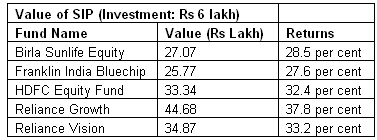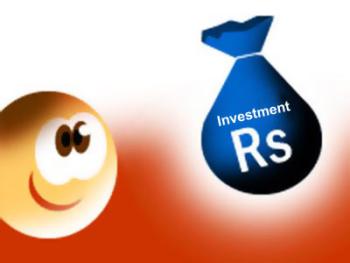
Resolutions are an integral part of your New Year rituals. Go back in time and recall your last year's resolution -- did you live up to at least some of it? Sometimes, New Year resolutions are those that go in one year and out the other (pun intended). We hope that this is not the case this year.
Have you thought about going into the New Year with some resolutions that are 'financial' in nature? If you haven't, may be this year, you can make a start by resolving to stay financially fit in 2010 and hopefully, you will keep the resolve through the year.
Click NEXT to read about a few simple financial don'ts that could keep you financially healthy through the year.
What are your financial resolutions for the New Year? If you want to share them for the benefit of our readers the message board below is all yours.

The first step towards investing is being disciplined.
Set aside a certain percentage of your earnings exclusively towards investments. And ensure that what you set is deployed appropriately to earn a decent return.
Using tax-efficient avenues can prove to be extremely fruitful especially in the long term. This new year, understand and evaluate the importance of investing, capacity of investible surplus and suitability of various investment avenues.
This new year resolve to start an SIP (systematic investment plan) for the long term. Some who had done so and invested in an SIP of Rs 5,000 per month for the last 10 years would have seen the returns as shown in the table below:


If there was one thing that last year taught you, it was about keeping a check on your EMIs (equated monthly installments). In the pursuit of comforts and luxury, you often burden yourself with numerous types of loans bearing fatal interest rates.
Some of your near ones would have learnt it the hard way if they had a floating rate interest EMI or was impacted by job losses. Check the feasibility, before you avail a loan; if your EMI demands you to adjust your life style, it may just not be worth it!
Keep tab on the EMI to net earnings ratio which should ideally not exceed 30 per cent (that is, your EMI payment should ideally not exceed 30 per cent of your net earnings). Credit card expenses are just one way of getting into a debt trap; not over-indulging will keep you away from this.
Not all debts are created equal, make a list of your liabilities and organise them by the annual interest rate. Those with highest rates should be paid off immediately. Pay your bills on time to avoid penalty.

Let your investment be. Like all of us in life need personal space and private time, so does your investment. For Pete's sake, don't pry on your investments every day, that's only going to make them nervous! When you have invested for a long-term objective, what is the point in measuring it up everyday?
Monitoring is good, you need to do it at regular intervals, however such intervals does not definitely mean on an hourly, daily or weekly basis. May be looking at it on a monthly basis makes sense and on a half-yearly basis you can take a call on any re-alignment that may be necessary.
However, if you are invested in equities, then you may need to keep your eyes wide open to spot that opportunity for booking some profits or gaining more equity exposure when the stock markets are falling.

Another key learning this year was that being contrarian in approach could be financially rewarding.
We started the year with a very challenging economic environment. So much so that governments had to dole out huge stimulus packages to support the economy. Most analysts had a negative outlook about the markets and the long-term survival of some of the largest global companies were being questioned. The financial system, the backbone of any economy, was in deep distress. This was the backdrop against which the indices have risen over 100 per cent this year
An investor who saw opportunity in this crisis would have seen some of the most spectacular returns. Being contrarian would only be possible when you are willing to give time to your investments to perform.
Monitor your investments in an unemotional way and when things go wrong try and understand whether it was just bad timing or if the investment itself was inappropriate.

Eventuality or health hazards may not be on your mind at the threshold of the New Year, but hedging your life / health hazard risk should be your top priority.
Evaluating how much life cover you may need could be a trying task; it involves understanding your spending pattern, the corpus required incase of an eventuality to run the household in your absence and factoring in the key financial goals which need to be achieved, for example child's education / marriage.
You also need to cumulate your outstanding liabilities and the figure that you have deduced is the life cover that you need. You can plan this by means of a term cover or align your needs alongside any of the innovative insurance plans that are available and ensure that you are adequately covered.
Health expenses have been escalating at a rate second only to expenses on education and therefore it becomes necessary to cover oneself and family adequately. If your parents are in the insurable age, avail a health plan for them. If your company cover (for yourself and family) is insufficient, you can top-up the same with a family floater plan.
If you have already availed life / health cover, revisit and evaluate their relevance based on your current financial position.

Tax planning often crops into your mind only during the fag end of a financial year (March 31). This year round, spend quality time, right at the start; utilise all the tax breaks efficiently and don't leave this important part of your financial planning for the last minute. Resolve this year to understand and invest.
Evaluate investment avenues that provide tax-free returns or even categorically invest in only such avenues where the returns are tax-free or tax-efficient.
Diversify and align your investments with your key financial goals. Make a vow, never to make haphazard investments and make efforts to consolidate all your investments from your need and risk / return perspective.

Because the right time to start your financial planning is now!
Financial planning involves taking a peek into your future. Not many of us are keen on planning for our future, we live by the day; it is high time we get a little more organised. If you are investing, good, but if you aren't aligning it to your goals, bad!
Sketch out your financial goals, if you haven't done them already. All your investments should be aligned to your long-term goals. Enlist the services of a competent financial advisor if required. Financial planning helps secure your future and your family's.
This is important since eventually all your investments must go towards achievement of your financial goals.
Hope this helps you in making some firm financial resolutions for the year. Remember that this will not only leave you with some extra dough in your pockets but bring security to your family and that should keep you motivated and committed to your resolutions.
Here's wishing all the readers a very happy and prosperous New Year. May the New Year bring in along with joy and peace, a sense of financial responsibility that will leave you wiser and richer!